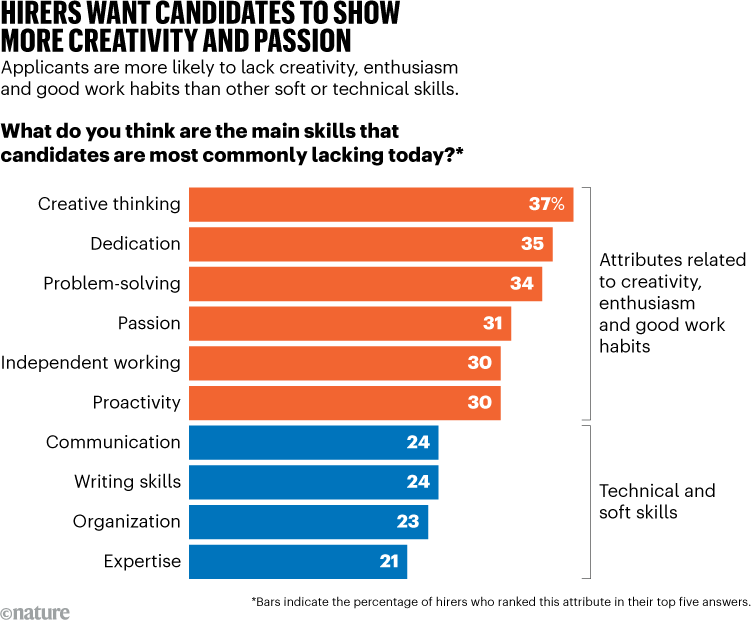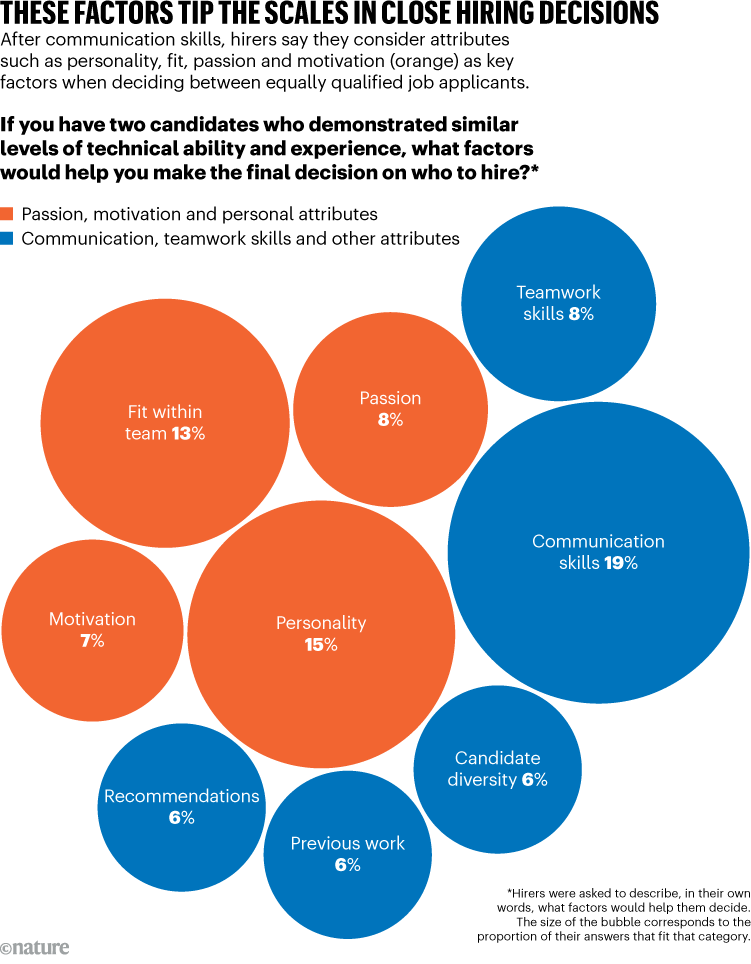Rachel Foster looks for evidence of “genuine interest” when screening applicants to join her microbial oceanography group at Stockholm University. “I want to know if they are applying for a job just to have a job, or if they are genuinely interested in the research,” she says.
Foster’s priorities echo those expressed by some 1,100 laboratory leaders and heads of research groups, in both academia and industry, who were surveyed by
Nature
to discover trends in science recruitment. When participants were asked what qualities candidates most often lack nowadays, the most common answer was creative thinking. But dedication ranked second and passion fourth (see ‘Hirers want candidates to show more creativity and passion’). Such qualities play a key part in hiring decisions. Asked to list the factors that would help them choose between two equally qualified candidates, hirers more often cited passion and enthusiasm or motivation than they did recommendations, candidate diversity or previous work experience (see ‘These factors tip the scales in close hiring decisions’).

At the same time, hirers want applicants to remain grounded, provide evidence to support their claims and not be overconfident, the survey found. Nearly one-third of hirers said that candidates seeming to exaggerate or fabricate their skills or background was one of the main challenges faced when recruiting — jumping to 41% of hirers when the question was restricted to the biggest challenges during the interview stage.
Balancing these two demands — showing passion and commitment while also coming across as humble and genuine — might seem daunting to jobseekers, especially if the thought of flaunting their passion to everyone pushes them outside their comfort zone. However, introverts need not fear, says Caroline Hill, who heads the Developmental Signalling Laboratory at the Francis Crick Institute in London. “People associate passion with exuberance, but just being terribly enthusiastic is not enough,” she says. Candidates should also
demonstrate dedication and deep interest
by pointing to relevant achievements and by showing an understanding of the role on offer, she says. “If someone tells me they like my papers, but can’t tell me why, they don’t come across as very genuine.”

Passion in word and deed
Cover letters are a great place to demonstrate passion and confidence, according to the
Nature
survey. Asked what is crucial for inclusion in cover letters, one bioscientist suggested that applicants “let their unique voice shine through”. And a group leader in the computer-science industry said that the most important thing to include is “why the job position interests you, and how you think you would benefit the company”.
Foster warns that any personal details included in cover letters need to be directly relevant to the candidate’s suitability for the position. “Don’t tell me that you love the beach and you’ve always wanted to work with the ocean. To me, that’s not passion,” she says. Instead, transparency about your motives for applying is key, she says. “I want to hire someone who genuinely wants to work on the research project that I’m advertising, either because they find the topic fascinating or because the training fits with their longer-term career goals.”
Hiring in science
Many hirers told
Nature
that they use job interviews to probe candidates’ motivations for seeking the role. They also use them to check whether an applicant’s actual performance matches their stated experience and interests. One team leader in the biotechnology industry said: “I try to ask at least one technical question that will make clear if they have the right level of experience. The answer will tell me if they are exaggerating their experience level or if they actually know what they are talking about.”
Hirers in industry were slightly less likely than academics to say that candidates lacked passion and dedication. However, they were almost twice as likely to pick “be honest, open and sincere” as the one piece of advice they would give candidates to help them stand out from the crowd.
Applicants for an industry job should think about
how they can demonstrate creativity in their research
, especially if the position is in innovation or product development, says Rob Gathercole, who leads work on apparel technology as the research director at leisurewear company lululemon, based in Vancouver, Canada. “Unlike in academia, where your research reputation may precede you, in industry interviews you need to showcase who you are and how your expertise, enthusiasm and understanding of the company and team will allow you to contribute meaningfully to its success,” he says.
A common mistake that academics make when applying for industry jobs is to emphasize their highly specific experience, he says. Industry rarely hires for this alone, he explains. Instead, what helps candidates stand out is soft skills — such as the ability to communicate complex ideas to non-experts, inspire others and work effectively in a team. Although technical skills and expertise are essential, those things really only crack open the door in industry, he says.
Generational and cultural barriers
Hill says the best recruitment processes are varied enough to allow different types of applicant to demonstrate their interest in and dedication to a role. Some might shine in a half-hour seminar, whereas others come out of their shell only when people start discussing their research, she says. “Some people are naturally very bubbly, and other people need things brought out of them a little bit.”
Hill thinks commitment is a better word than passion to describe what she looks for in candidates. Several other people that
Nature
spoke to agreed that passion was a problematic term — not least because it means different things to different people.

Caroline Hill hires people with genuine interest in the research, including Andrew Economou.
Credit: Janie Airey
Foster, who started her career in the United States before moving to Europe, says that cultural norms differ around the world with regard to how much night and weekend work scientists are expected to do — which some might view as a measure of passion or dedication. When she worked in the United States, labs used to be quite full on weekends, she recalls, whereas at her institute in Germany, she found that only foreigners worked on Saturday or Sunday. In Sweden, it’s usually just her in the lab at weekends, a habit she describes as being a relic of her “American point of view”.
Millennials — people now in their thirties or early forties, who are probably dominant in today’s entry-level, post-PhD job market — might view passion and dedication differently from earlier generations. Although studies have found that millennials are as committed to their work as are their more-senior colleagues, millennials were also found to place a higher value on workplace fulfilment and support and are less willing to make personal sacrifices to meet excessive work demands (see
go.nature.com/3znhyrv
).
Nail your tech-industry interviews with these six techniques
Hill, who has been hiring scientists for three decades, says she has noticed a similar shift in younger generations of jobseekers. Although candidates tend to be more diverse and polished than before, which she says is really positive, there is less tolerance for the long hours that she thinks can be essential for a successful research career. Nowadays, some applicants look for more of a nine-to-five job, she says. “That’s difficult in science, where flexibility is crucial. I see a research career as more of a vocation, which is its own reward and where you get out what you put in.”
Casey Greene, a bioinformatician at the University of Colorado Anschutz Medical Campus in Aurora, thinks that engagement is a better term for what the hirers surveyed by
Nature
feel is missing in applications. “There can be a lack of engagement sometimes, where a candidate might not do any research about a lab or a company or their products” before being interviewed, he says. To show engagement, applicants should prepare for their application carefully and mindfully, he adds. According to the survey, a lack of knowledge about the prospective employer’s research is the most common mistake applicants make (42% of hirers selected this as a ‘key mistake’), with giving generic answers in interviews a close second (37%).
Greene says that applicants can do their homework by looking at a few of the most recent papers or preprints from the lab they might be joining to find up-to-date information on what the lab is working on. If the research has a coding or informatics element, then looking up the team and its projects on code-sharing platforms such as GitHub would be worthwhile, he says.
Greene says that such preparation can be not only a recipe for success, as documented by the survey responses, but also a more comfortable path for most early-career job applicants “than the feeling that you have to turn it up to 11”.




